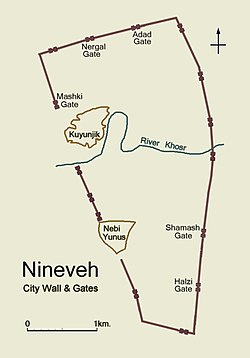Nahum 1
| Nahum 1 | |
|---|---|
← Micah 7 | |
 | |
| Book | Book of Nahum |
| Category | Nevi'im |
| Christian Bible part | Old Testament |
| Order in the Christian part | 34 |
Nahum 1 is the first chapter of the Book of Nahum in the Hebrew Bible or the Old Testament of the Christian Bible.[1][2] This book contains the prophecies attributed to the prophet Nahum, and is a part of the Book of the Twelve Minor Prophets.[3][4] This chapter describes the character of God in giving a fair judgment upon Nineveh.[5]
Text[]
The original text was written in Hebrew language. This chapter is divided into 15 verses.
Textual witnesses[]
Some early manuscripts containing the text of this chapter in Hebrew are of the Masoretic Text, which includes the Codex Cairensis (895), Aleppo Codex (10th century), Codex Leningradensis (1008).[6]
Fragments cumulatively containing all verses of this chapter were found among the Dead Sea Scrolls including 4QpNah, known as the "Nahum Commentary" (1st century BCE) with extant verses 3–6;[7][8] 4Q82 (4QXIIg; 1st century BCE) with extant verses 7–9.[9][10][11] and Wadi Murabba'at MurXII (1st century CE) with extant verses 1–15 (verses 1:1-14; 2:1 in Masoretic text).[9][12]
There is also a translation into Koine Greek known as the Septuagint, made in the last few centuries BC, with extant manuscripts including Codex Vaticanus (B; B; 4th century), Codex Sinaiticus (S; BHK: S; 4th century), Codex Alexandrinus (A; A; 5th century) and Codex Marchalianus (Q; Q; 6th century).[13] Some fragments containing parts of this chapter (a revision of the Septuagint) were found among the Dead Sea Scrolls, i.e., Naḥal Ḥever (8ḤevXIIgr; 1st century CE) with extant: verses 13–14.[9][14]

Structure[]
NKJV groups this chapter:
- Nahum 1:1-8 = I. The Character of God: The holiness of the LORD; judgment upon Nineveh
- Nahum 1:9-15 = II. God's Punishment of His Enemies.
Verse 1[]
- The burden of Nineveh. The book of the vision of Nahum the Elkoshite.[15]
- "burden" is translated from Hebrew word: משא ma·syā,[16] which can also mean "oracle".[17]
- "Elkosh", the hometown of prophet Nahum, has been identified with several cities, including the modern Alqosh of Assyria and Capharnaum of northern Galilee.[18]
Verse 4[]
- He rebukes the sea and makes it dry,
- And dries up all the rivers.
- Bashan and Carmel wither,
- And the flower of Lebanon wilts.[19]
- Bashan, Carmel, and Lebanon are known to be places of lush vegetation and among the most fertile regions of Palestine.[5][20]
See also[]
- Calming the storm
- Related Bible parts: Exodus 20, Psalm 18, Matthew 8, 2 Timothy 2
References[]
- ^ Collins 2014, p. 342.
- ^ Hayes 2015, 18. Judean Prophets: Micah, Zephaniah, Nahum, Habakkuk, Jeremiah.
- ^ Metzger, Bruce M., et al. The Oxford Companion to the Bible. New York: Oxford University Press, 1993.
- ^ Keck, Leander E. 1996. The New Interpreter's Bible: Volume: VII. Nashville: Abingdon.
- ^ a b The Scofield Study Bible, Oxford University Press. 2003. ISBN 9780195278583. pp. 1185-7.
- ^ Würthwein 1995, pp. 35–37.
- ^ VanderKam, James C., The Dead Sea Scrolls Today, Grand Rapids: Eerdmans, 1994. pp. 10-11.
- ^ Fitzmyer 2008, p. 49.
- ^ a b c Dead sea scrolls - Nahum
- ^ Ulrich, Eugene, ed. (2010). The Biblical Qumran Scrolls: Transcriptions and Textual Variants. Brill. pp. 616. ISBN 9789004181830. Retrieved May 15, 2017.
- ^ Fitzmyer 2008, p. 39.
- ^ Fitzmyer 2008, pp. 140–141.
- ^ Würthwein 1995, pp. 73–74.
- ^ Fitzmyer 2008, p. 127.
- ^ Nahum 1:1 KJV
- ^ Hebrew word #4853 in Strong's Concordance
- ^ New King James Version
- ^ Nahum at The Catholic Encyclopedia
- ^ Nahum 1:4 KJV
- ^ The Nelson Study Bible. Thomas Nelson, Inc. 1997. ISBN 9780840715999. pp. 1514-5.
Sources[]
- Collins, John J. (2014). Introduction to the Hebrew Scriptures. Fortress Press. ISBN 9781451469233.
- Fitzmyer, Joseph A. (2008). A Guide to the Dead Sea Scrolls and Related Literature. Grand Rapids, MI: William B. Eerdmans Publishing Company. ISBN 9780802862419.
- Hayes, Christine (2015). Introduction to the Bible. Yale University Press. ISBN 978-0300188271.
- Würthwein, Ernst (1995). The Text of the Old Testament. Translated by Rhodes, Erroll F. Grand Rapids, MI: Wm. B. Eerdmans. ISBN 0-8028-0788-7. Retrieved January 26, 2019.
External links[]
| Wikisource has original text related to this article: |
| Look up Nahum in Wiktionary, the free dictionary. |
- Unique Pictures Of Nahum Tomb By Kobi Arami
- Jewish translations:
- Nachum – Nahum (Judaica Press) translation [with Rashi's commentary] at Chabad.org
- Christian translations:
- Online Bible at GospelHall.org (ESV, KJV, Darby, American Standard Version, Bible in Basic English)
- BibleGateway
- Nahum – King James Version
 Nahum public domain audiobook at LibriVox Various versions
Nahum public domain audiobook at LibriVox Various versions
- Book of Nahum chapters
